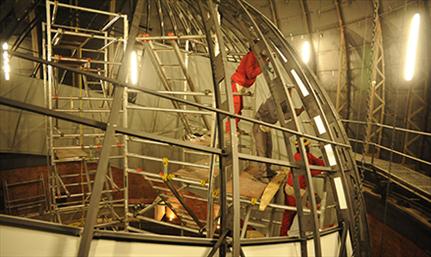Latest News Archive
Please select Category, Year, and then Month to display items
14 June 2024
|
Story Anthony Mthembu
|
Photo Suplied
 Jeremiah Hlahla, a UFS student completing his PhD in Botany at the University of Debrecen as part of an exchange initiative funded by the Erasmus+ Mobility Programme.
Jeremiah Hlahla, a UFS student completing his PhD in Botany at the University of Debrecen as part of an exchange initiative funded by the Erasmus+ Mobility Programme.
As part of an exchange initiative facilitated by the Erasmus+ Mobility Programme, Jeremiah Hlahla, a student at the University of the Free State (UFS), is nearing the completion of his PhD studies at the University of Debrecen in Hungary. Hlahla’s journey, which began in February 2024 and is set to conclude in July 2024, has been a remarkable learning opportunity. “As a first time-traveller to Europe, I have thoroughly enjoyed engaging with people from different countries and cultures,” he said.
The benefits of international collaboration
Hlahla is currently pursuing a PhD in Botany, focusing on plant stress physiology. “My current PhD project investigates the physiological, biochemical and morphological responses of vegetable-type soybean, or edamame, to combined drought and heat stress,’’ he explained. He considers the University of Debrecen the ideal institution to complete his research due to its extensive expertise and resources in similar projects. He noted that his colleagues at Debrecen conduct significant work on plant protection against biotic and abiotic stresses, including salt and drought stress, as well as proteins and amino acids in barley and other legumes.
Given the vast knowledge available on similar projects, Hlahla has found substantial engagement with his work at the University of Debrecen. “Upon arrival, I delivered an introductory lecture presenting my UFS project on the synergistic effects of combined drought and heat stress on the physiology and biochemistry of edamame. It was an engaging session as everyone could relate to my work and asked many questions,’’ he said.
Insights gained from the exchange
Hlahla has also gained valuable lessons that will assist him in his research career, including biotechnology and physiology tools. “I learned how to prepare samples and use high-performance liquid chromatography (HPLC) and reversed-phase ultra-high-performance liquid chromatography (UHPLC) to quantify proteins and amino acids,’’ he said. These techniques are beneficial not only for his current work but will also support future soybean research.
As his experience at the University of Debrecen nears its end, Hlahla reflects on the collaborations and friendships he has formed, which stand out as a significant highlight.
Interior dome of Naval Hill planetarium reaches completion
2013-09-04
|
 |
Work on the inside of the dome
Photo: Reinier Brönn
01 September 2013 |
The interior perforated aluminium planetarium dome has been installed by an American expert from Astro-Tec, the American company that customised the dome for the planetarium on Naval Hill. The planetarium, the first digital planetarium in sub-Saharan Africa, is scheduled to open in November 2013. The UFS manages the project.
The dome arrived in parts by ship from the USA in June 2013. These parts consisted of a number of long curved ‘ribs’ and numerous perforated panels. The panels were attached in sections to the ribs to form a smooth concave shell, creating the surface for the projection system.
The next step will be the installation of the projection system itself.
The 86-year old Lamont-Hussey Observatory on Naval Hill, also known as the Sterrewag Theatre, is home to the planetarium. The planetarium is the first component of a proposed Centre for Earth and Space. This will be a multi-purpose facility to promote science communication and preservation, and the arts.
This project is a long-term partnership between three main organisations, each bringing essential components to the project: the Mangaung Metro Municipality (MMM) as the land-owner, the Free State Department of Economic Development, Tourism and Environmental Affairs (DETEA) and the UFS, which developed the concept for the planetarium project and will be responsible for its operation and further fundraising endeavours.
The National Department of Science and Technology also joined this venture subsequent to providing substantial funding to the UFS in order to purchase the projection system for the planetarium.